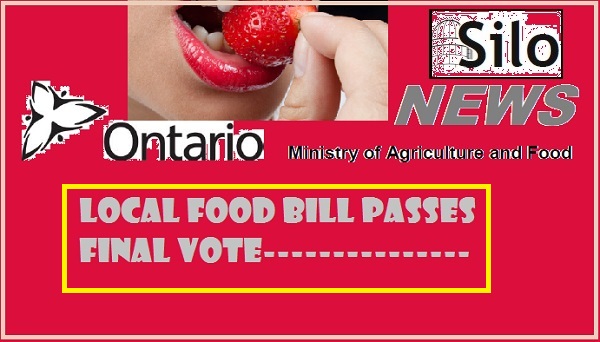Ontario is moving forward to help promote the good things that are grown, harvested and processed in Ontario with today’s passage of the Local Food Act, 2013. The new legislation is part of a strategy http://www.omafra.gov.on.ca/english/about/localfood.htm to build Ontario’s economy by making more local food available in markets, schools, cafeterias, grocery stores and restaurants. This will create jobs and expand the province’s agri-food sector.
The new legislation — the first of its kind in Canada — will increase local food awareness, and boost sales by setting local food goals and targets in consultation with sector partners. The act will also create a non-refundable tax credit of 25 per cent for farmers who donate their surplus harvest to eligible community food programs such as food banks, and proclaim a Local Food Week that will take place annually, beginning the first Monday in June. Building a stronger agri-food industry is part of the government’s economic plan to support a dynamic and innovative business climate, invest in people and invest in infrastructure.
QUOTES
“The Local Food Act will benefit people by making the connection between buying local and helping grow an important Ontario industry. If we increase demand to homegrown food, we will create jobs and boost the agri-food sector’s contributions to our economy. It’s an important and historic step forward and I thank everyone who helped support this legislation.” — Kathleen Wynne, Premier of Ontario and Minister of Agriculture and Food
“The Local Food Act will serve as a constant reminder of the bounty of Ontario. The Ontario Federation of Agriculture is happy to see that it will target food literacy, local food use and will help farmers attend to the needs of others through a community food donation tax credit.” — Mark Wales, Ontario Federation of Agriculture
“By raising the profile of local food, the Local Food Act will provide Ontario food and beverage processors with an opportunity to further develop local food systems and market development strategies. Ontario consumers are demanding high quality food and drink, and our processors are willing and able to deliver. ” — Steve Peters, Alliance of Ontario Food Processors
QUICK FACTS
The Local Food Act will also require the government to produce an annual local food report on its activities to support local food. The province’s agri-food sector contributes approximately $34 billion to the economy and supports more than 740,000 jobs across Ontario. The province’s farmers produce more than 200 commodities, including fruits, vegetables, livestock, dairy, poultry, grains and oilseeds. Food processors in Ontario purchase about two-thirds of the food that is produced on the province’s farms.
Ontario’s Local Food Fund is part of a $30 million investment from the province to create jobs and support innovative local food projects over the next three years (2013-2016).
LEARN MORE
About the Local Food Fund and how to apply http://news.ontario.ca/omafra/en/2013/09/growing-more-local-food-opportunities.html . Discover award-winning local food innovators in Ontario http://www.omafra.gov.on.ca/english/premier_award/2012-13/winners/index.htm. Be adventurous in the kitchen by visiting Foodland Ontario and trying new recipes http://www.ontario.ca/foodland/foodland-ontario.

UPDATE November 17 2021
SIMCOE – Haldimand-Norfolk MPP Toby Barrett is encouraging local agriculture producers and agri-food businesses to apply for two new important funding programs.
As of today, November 17, 2021, the province has expanded the Enhanced Agri-Food Workplace Protection Program (EAWPP), to help reimburse farms, food processors and other agri-food businesses, in the effort to guard against the spread of COVID-19.
This program was implemented to support worker health and safety during the pandemic. The changes include:
An extended application deadline to February 1, 2022, or until funding is fully allocated.
An increased amount of cost-share funding for eligible expenses up to $50,000. The cost-share will continue to be 60% of eligible expenses.
Expanded eligibility to include food and beverage processors with three or more employees, agri-food industry organizations/associations, and poultry catchers/vaccinators and professional barn cleaners.
Expanded eligibility to include poultry catchers/vaccinators and professional barn cleaners.
Expansion of eligible expenses to include extraordinary costs resulting from extended COVID-19 quarantine period beyond 14 days.
Businesses that have already applied will be contacted directly with instructions on how to amend their application under the expanded eligibility.
The second program is The Canadian Agricultural Partnership’s (CAP) Meat Processor Capacity Improvement Initiative. This investment will provide up to $150,000 per project for handling and processing equipment to increase efficiency, productivity and food safety. It will also cover consulting and engineering costs associated with planning future projects. Applications open on November 19, 2021.
“These programs are another example of how the Government of Ontario is assisting agriculture in difficult times,” said Haldimand-Norfolk MPP Toby Barrett. “I’m telling as many people as I can to apply, as these investments will improve our sector, and assist those who incurred extras expenses as a result of the pandemic.”
For more information, contact MPP Toby Barrett at 519-428-0446 or toby.barrett@pc.ola.org
Please mention The Silo when contacting.